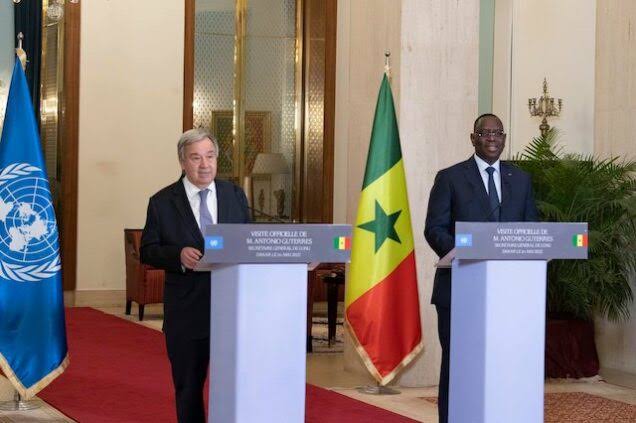UN Secretary-General António Guterres has highlighted the impact of the Ukraine war on Africa, saying the crisis is aggravating a “triple food, energy and financial crisis” across the continent.
The UN correspondent of the News Agency of Nigeria (NAN) reports that Guterres began a Ramadan solidarity visit to three West African countries, Nigeria, Senegal and Niger on Saturday.
He is expected to be in Nigeria on Tuesday.
While in Dakar, the capital of Senegal on his first visit to the continent, Guterres said: “when discussing the socio-economic situation, it is impossible not to mention the war in Ukraine and its impact on Africa.”
The UN chief made the remarks after meeting President Macky Sall of Senegal, who said that the war in Ukraine was “a human tragedy” which could have “a dramatic impact on economies, in particular, those of developing countries”.
The conflict in Ukraine is driving up global food and fuel prices; senior UN officials are concerned that rising costs will push more people into hunger.
It could also lead to political instability and social unrest in some parts of Africa, where food prices have increased by a third since 2021.
Before the Russian invasion began in February, the combination of climate change, conflict and the COVID-19 pandemic was already impacting the socio-economic situation in Africa, especially in the Sahel region which includes Senegal.
Guterres and Sall had toured a new hi-tech vaccine production facility, currently being built by the Institut Pasteur in Dakar.
When completed, it will be able to produce a range of vaccines, including Pfizer-BioNTech, one of the most widely used immunisations against COVID-19.
It will also be able to manufacture experimental vaccines against malaria and tuberculosis.
At the end of World Immunisation Week, Guterres said it was necessary to build true vaccine equity across the world adding that it was “unacceptable” that close to 80 per cent of Africans were not vaccinated against COVID-19; a situation he called a “moral failure”.
Sall had called for pharmaceutical sovereignty by supporting the emergence of an African pharmaceutical industry capable of meeting basic needs and coping with pandemics.
As part of the COVID-19 recovery plan, Senegal is strengthening its drugs manufacturing sector.
It’s expected that the vaccination facility will produce at least 50 per cent of the country’s needs.
Guterres added that the world’s “wealthiest countries and pharmaceutical companies should accelerate the donation of vaccines and invest in local production,” of the type seen at Institut Pasteur facility.
Addressing reporters in Dakar, Guterres said “we must ensure a steady flow of food and energy in open markets, removing all unnecessary export restrictions”.
Read also: “Be grateful and complain less” – Obi Cubana advises Nigerian youths on developing positive attitude
He added that countries must resist the temptation to hoard and instead release strategic stocks of energy.
The UN estimates that a quarter of a billion people could be pushed into extreme poverty in 2022, caused by the consequences of the conflict in Ukraine. (NAN

